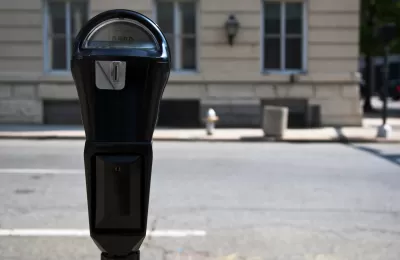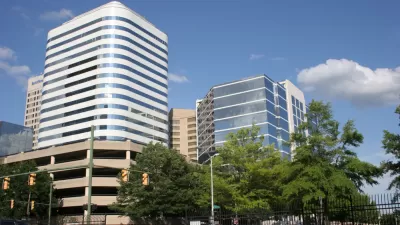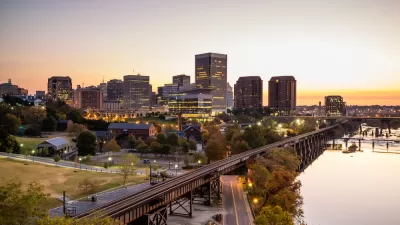The Virginia city is replete with underused off-street parking lots, which city councilors hope to make available for parking at more times while encouraging transit use.

Richmond, Virginia joined the growing list of cities to repeal parking minimums as one strategy for making housing more affordable and less costly to build, reports Elizabeth McGowan in Next City.
The move was, surprisingly, approved unanimously by the city’s Planning Commission and city council. City Councilor Andreas Addison, who has been a staunch supporter of repealing parking requirements, points out that there is plenty of parking space in the city, it’s just often designated for one single use, making it obsolete the rest of the time. “When that data was presented, I realized we don’t have a parking problem,” said Addison, “We have a lack-of-access-to-parking problem.”
Addison “envisions the new measure will ‘reinvent paved space’ by introducing the concept of shared parking in off-street lots. Before, those spaces could only be used for the particular purpose laid out in the zoning code.”
Meanwhile, the Greater Richmond Transit Company (GRTC) is still offering free rides on its buses and opened a high-capacity bus rapid transit line five years ago. “Addison is hopeful Richmond’s decision to scale back on parking lots can be a model for other Virginia cities intent on reshaping how people move around.”
FULL STORY: Richmond Scraps Parking Space Rules In An Effort To Curb Transportation Emissions

Study: Maui’s Plan to Convert Vacation Rentals to Long-Term Housing Could Cause Nearly $1 Billion Economic Loss
The plan would reduce visitor accommodation by 25,% resulting in 1,900 jobs lost.

North Texas Transit Leaders Tout Benefits of TOD for Growing Region
At a summit focused on transit-oriented development, policymakers discussed how North Texas’ expanded light rail system can serve as a tool for economic growth.

Using Old Oil and Gas Wells for Green Energy Storage
Penn State researchers have found that repurposing abandoned oil and gas wells for geothermal-assisted compressed-air energy storage can boost efficiency, reduce environmental risks, and support clean energy and job transitions.

Private Donations Propel Early Restoration of Palisades Playground
Los Angeles has secured over $1.3 million in private funding to restore the Pacific Palisades playground months ahead of schedule, creating a modern, accessible space that supports community healing after recent wildfires.

From Blight to Benefit: Early Results From California’s Equitable Cleanup Program
The Equitable Community Revitalization Grant (ECRG) program is reshaping brownfield redevelopment by prioritizing projects in low-income and environmental justice communities, emphasizing equity, transparency, and community benefits.

Planting Relief: Tackling Las Vegas Heat One Tree at a Time
Nevada Plants, a Las Vegas-based nonprofit, is combating the city’s extreme urban heat by giving away trees to residents in underserved neighborhoods, promoting shade, sustainability, and community health.
Urban Design for Planners 1: Software Tools
This six-course series explores essential urban design concepts using open source software and equips planners with the tools they need to participate fully in the urban design process.
Planning for Universal Design
Learn the tools for implementing Universal Design in planning regulations.
Ascent Environmental
Borough of Carlisle
Institute for Housing and Urban Development Studies (IHS)
City of Grandview
Harvard GSD Executive Education
Toledo-Lucas County Plan Commissions
Salt Lake City
NYU Wagner Graduate School of Public Service





























